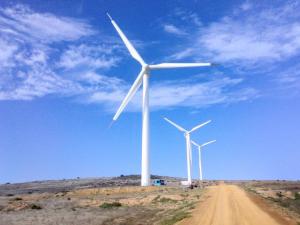The combined allocation was shared between seven onshore wind energy bidders (787 MW), six solar photovolatic (PV) projects (450 MW), a 16.5 MW biomass project, a 18 MW landfill-gas bidder and two concentrated solar power (CSP) bidders (200 MW).
A consortium led by Spanish firm Abengoa has been chosen to build a second 100 MW concentrating solar power (CSP) plant in the Northern Cape province, to combine with a 100 MW solar thermal plant already under construction to form the largest solar energy complex in Africa.
The department is scheduled to officially announce the preferred bidders on Monday for the third round of its renewable energy programme for independent power producers, which aims to add 17 800 MW from renewable sources to South Africa’s energy mix by 2030.
Abengoa, which was confirmed on Tuesday as one of the preferred bidders, is currently building a 50 MW solar tower plant near Upington, also in the Northern Cape, and a 100 MW parabolic trough solar plant, dubbed KaXu Solar One, near Pofadder.
The company said on Tuesday that the new parabolic trough solar plant, Xina Solar One, would be located alongside KaXu Solar One, with construction expected to start in 2014, and that the two 100 MW plants would “jointly shape the largest solar complex in Africa”.
Abengoa will control 40% of the consortium that owns Xina Solar One, with the rest controlled by the state-owned Industrial Development Corporation (IDC), the Public Investment Corporation (PIC) and the KaXu Community Trust.
According to Abengoa, Xina Solar One will produce sufficient clean energy to power approximately 90 000 households while reducing South Africa’s carbon dioxide emissions by up to 315 000 tons annually.
“Additionally, the construction, operation and maintenance of the plant will stimulate regional socio-economic development by creating numerous direct and indirect jobs, as well as a supply chain that will foster economic growth in the country,” the company said in a statement.
Abengoa CEO Manuel Sanchez Ortega said the project once again illustrated “the maturity of solar thermal technology, which can be efficiently stored and used when it is needed.
“We are extremely satisfied with the trust that has been placed in us by the South African government and the partners that accompany us in this project,” Ortega added.
Parabolic trough technology employs parabolic-shaped mirrors that are set on a structure so they can track the movement of the sun and concentrate solar radiation onto a receiving tube. Inside the tube, a heat-absorbing fluid flows and reaches high temperatures. This fluid transfers the thermal energy to a heat exchanger, and then is used to heat water into steam, which ultimately drives a turbine to generate electricity.
Abengoa said Xina Solar one would incorporate a five-hour thermal energy storage system using a set of thermal storage tanks filled with molten salts. This would give the plant the ability to generate electricity after sunset or during cloudy periods, in addition to the ability to adapt energy production to the peaks of demand.
The Department of Energy (DoE) has told another 17 renewable-energy developers that they have been appointed as preferred bidders. This is after the conclusion of the third bid-submission round under the Renewable Energy Independent Power Producer Procurement Programme (REIPPPP), says an Engineering News report.
The DoE confirmed that it had received 93 bid responses and that the projects represented by the 17 preferred bidders had a collective installed capacity of 1 471.5 MW.
The report says the appointments raise the number of renewables developers to have prevailed under SA’s REIPPPP process to 64, with 47 projects already at various stages of development.
The prices associated with the third-round projects were not immediately available, the report notes. A Cape Times report states that the department would decide on more bidders by 20 November. The government plans to add 3 725MW of renewable energy capacity by 2016 with five tenders.
A consortium led by Mainstream Renewable Power, one of Europe’s leading wind-energy developers, has emerged among the preferred bidders for the REIPP programme. A BDlive report states that Mainstream entered into a partnership with Thebe Investment Corporation, Old Mutual and local community members to invest an estimated R9bn to build three wind energy projects in the Northern Cape, expected to generate 360MW for the national grid.
After concluding the second round of bids in May, the department had promised it would place a strong emphasis in the third round on companies’ local content and economic development.


